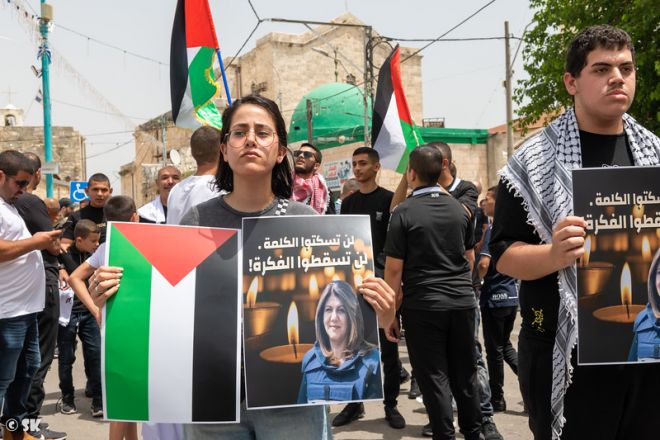In Memory of Assassinated Palestinian-American Journalist Shireen Abu Akleh
Published on June, 02 2022
Poster of Abu Akleh with caption “You won't silence the truth. You won’t kill the idea!” Source: Wikipedia
By Charlotte Dennett
Middle East Peace and Justice Action Committee
June 2022
It seemed impossible to describe the flood of emotions that swept through me — and millions of others—at the news on May 11 that a brave Palestinian-American journalist named Shireen Abu Akleh had been killed by an Israeli soldier. The 55-year old veteran reporter for Al-Jazeera was shot in the head as she tried to cover an Israeli raid on the West Bank refugee camp of Jenin. The Israeli government, noted Amos Harel of Israel’s Haaretz newspaper, initially resorted to the usual post-incident explanation by suggesting that nearby Palestinian terrorists were to blame. But this time, CNN did its own investigation, and concluded on May 24 that no Palestinians were anywhere near Abu Akleh and there was no active combat in the area. CNN cited as evidence newly secured videos of the scene from eye witnesses, an audio forensic analyst and an expert in explosive weapons. Their conclusion was that Abu Akleh was the victim of a targeted attack by Israeli forces.
What struck me the most, as an American born in Beirut, as a former reporter for the Beirut Daily Star, as someone who has lived with and railed against biased, pro-Israel reporting in the American media for most of my life, was the outpouring of grief by the Palestinian people for this woman. According to the New York Times she was a trailblazer in Middle East reporting, focusing on the human side of Palestinians suffering under Israeli occupation. As mourners gathered at the family home in occupied East Jerusalem, its entrance adorned by Palestinian flags and photos of Shireen, Israeli police showed up demanding the flags come down. Said one witness whose son was beaten at the funeral procession two days later, Israeli authorities fear the Palestinian flag because it represents Palestinian identity just as Shireen did.
She dared to report on the funerals of Palestinians killed by Israeli forces, on the Israeli attacks on Gaza in 2008 and 2004, and, ironically, on the 2002 Battle of Jenin, described by a UN envoy as horrific beyond belief, in which houses were bulldozed with families still inside, ambulances could not reach the injured, and Palestinians were summarily executed.
She had been asked, back in 2017, by an NBC affiliate if she was ever afraid of being shot, and she answered with disarming candor: Of course she gets scared, but when covering a story, she forgets to be scared and concentrates on positioning herself and fellow journalists in a safe place. Above all, she tries to get the story.
Barbara Taft, long-time co-chair of WILPF’s Middle East Committee, in a Memorial Day tribute to Shireen at her church in San Jose, California, reminded parishioners that this was not the first time that journalists had been targeted. “Israelis bombed the Press building in Gaza during fighting last year, destroying the offices of Associated Press, Al Jazeera, and several other news outlets that were trying to cover what was happening there,” she said. “Besides that, a total of at least 19 Palestinian journalists have been killed there since 1992.”
I have a confession to make. I did not know Shireen—my Middle East reporting was in the early 1970’s, whereas she began her journalist career in 1997—but more significantly, I did not know of her. How could that be, I asked myself?
What comes immediately to mind was an effort, in my writings for American audiences, to cite only mainstream media sources—and Israeli sources rather than Al Jazeera—so as to gain credibility. For, as many journalists and historians know, once you show any sympathy for the Palestinians, you are branded as pro-Arab and you are likely to be dismissed as “anti-Semitic”—a smear that has been used successfully for over seven decades by Israeli proponents and their American supporters to hide the truth about one of the most severe—and most censored—reigns of oppression in modern history, one that is finally being compared to apartheid South Africa.
South Africa’s Bishop Tutu Foundation described the attacks on the funeral procession as being chillingly reminiscent of the kind of brutality visited upon mourners at funerals of anti-apartheid activists in South Africa. The UN Secretary General called for an immediate investigation. Surprisingly, so too did 57 members of the US House in a letter to the FBI and the State Department, due to conflicting reports on her death.
To be sure, there should be a U.S. objection and reaction to the killing of a journalist, a famous Palestinian-American journalist at that. But how to explain the muted world reaction to the ongoing destruction of Palestinian villages? Most recently, the demolitions have increased in the West Bank villages of Masafer Yatta, whose residents fought for two decades to prevent the demolition of their homes—only to suffer a recent decision by Israel’s supreme court that their land could be used for military use. To its credit, the Guardian said this decision was reminiscent of the expulsions that occurred when occupation began in 1967, paving the way for more evictions of everyone living in the area.
Shireen Abu Akleh is known for her [now poignant] quote, “You won’t silence the truth/You won’t kill the idea.” She was right. After all the investigations are over, the story of her life – and death- will have achieved a greater international understanding that a lasting peace in the Middle East cannot happen without justice for the Palestinian people, the people she loved and so loyally served.



